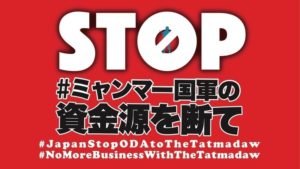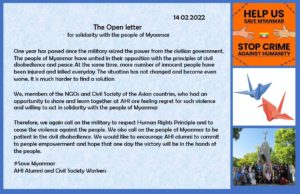Community has ownership of their own issues
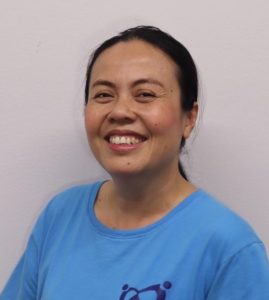
By Siriwan Arsasri, Health And Share Foundation (HSF), ILDC 2011, Thailand
Health And Share Foundation (HSF) has been working on primary health care and HIV/AIDS activities. Since the pandemic began in Thailand in 2019, the number of COVID-19 infected cases has increased day by day. Ubon Rachathani Province where our project area is has cumulative patients about 18,568 cases (MOPH, as of October 2021). The sick people could not access to health services for treatment. The serious cases were found dead at home. Migrant people moved back to their hometown to receive treatment at the hospital.
When sick and high-risk people returned home, health volunteers are the first persons to access the patients and do screening and report to COVID19 information center. They worked bravely without prevention tools such as mask, sanitizer gel and budget for overtime working peridium. If there was no health volunteers in countryside, it could be worse as in Bangkok.
People had fear and tried to keep away from the patients. They just believed the information from mass medias which was not telling what to do for COVID-19 prevention, but incited fear among people. People were in panic because they did not know what they should do. Moreover, they do not get any support from the government such as mask, soap or sanitizer gel for prevention and the information to live with and take care of the infected patients.
Negative attitude among people
People in the community, however, were afraid of infection. They just believed the information from mass medias which did not suggest what to do for prevention, but incited fear among people. People were in panic because they did not know what they should do. Moreover, they do not get any support from the government such as mask, soap or sanitizer gel for prevention and the information to live with and take care of the patients.
ecause there was no place for isolation, the community team consisting of sub district officer, head of village, health volunteers separated and push the patients to live far away. The places are, for example, small hut in farm, abandoned house and temple, where there was no electricity, water and toilet. Nobody could take care of the patients but for the specialists. It made people think that COVID-19 patients can never live in the community. Some families kept a secret about the infected family member for fear that they would be blamed and not accepted from community. Negative attitude was shown even in family. It was the same discrimination against people with HIV/AIDS.
For another reason, Ubon Rathchathani Province has many natural check points, where people can easily cross the border. In the next time country unlocked the border again, many migrant workers from Laos PDR were to come and get through Ubon Rathchathani to Bangkok and other places. We needed to get ready for the expected situation before the country unlock.
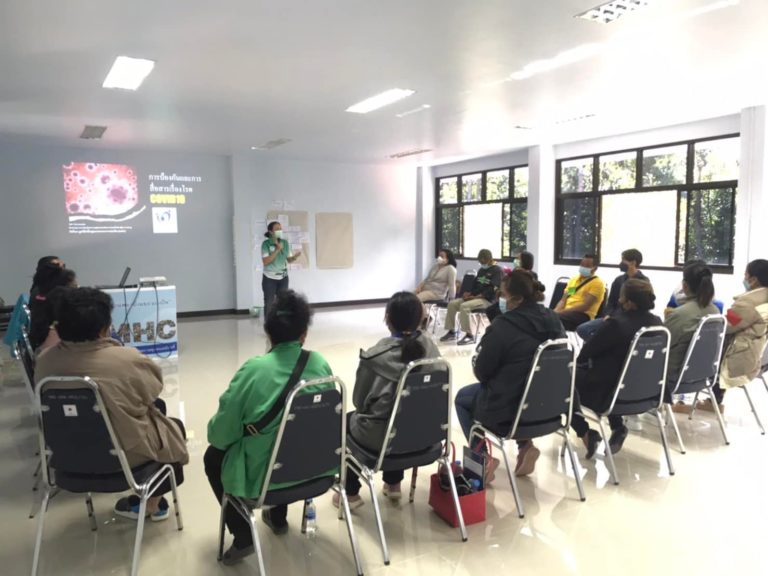
HSF response to the issues
HSF had COVID-19 prevention meeting with influential community leaders in 7 border sub districts (50 people each) in Ubon Ratchathani Province. They are head of villages, active citizens including 2 persons with HIV/AIDS and health volunteers at Khemarat hospital. All of them have joined our HIV/AIDS activities as HSF partner leaders. We discussed on how to prevent infection and provide the knowledge to people correctly.
The following activities were planned;
1. Training community leaders
– Discuss what they feel/worry about COVID-19 in community?
– Discuss how the infection spread among people and provide knowledge of DMHTT; Distancing, Mask, Hand wash, Testing, and Thaichana (Thai win application) to apply for information of COVID19.
– Risk analysis (Quality and quantity of virus, and route of transmission of virus to our body)
– Keep It Short and Simple Technique (KISS) or Elevator speech with positive communication such as paying respect to audience (not decide instead, let people know and make their own choice), deep Listening, etc.
2. Supporting COVID19 prevention equipment (Mask, soap and hand sanitizer gel) to community leaders and vulnerable people in 7 sub districts.
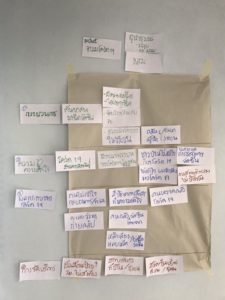
The community leaders also brainstormed the factors causing the negative attitude toward COVID-19 infected persons and compared with HIV/AIDS. All of them had involved with HIV/AIDS discrimination in their community before. 2 persons with HIV/AIDS shared their own experiences of being discriminated to others. Understanding how they came to tackle with HIV/AIDS issues, they were convinced that the negative attitude toward COVID-19 infected people can be also changed if they understand the disease and how to prevent.
We made following plans to solve the problems;
– Implement Group meeting in community facilitated by community leaders to provide knowledge, prevention and basic health care.
– Share the works among the group to do home visit in community by using flip chart of COVID 19 with pictures.
– Screen case for case conferences with stakeholders (hospital, subdistrict office, school, head of village etc..) and referring the case access to system (health, right, education).
Outcomes
1. 5-10 community leaders in each village in Khemarat sub district already did health group meetings to provide knowledge about COVID 19 and discuss on prevention with positive communication in their own community.
2. These leaders and hospital staff did campaign about COVID 19 vaccination and outreach to people in community to give shots in community. 80% of people in Khemarat sub district already got vaccinated.
HSF has recognized that it is important for community to have an ownership of their own problems so that they can solve by themselves. If they know what they should do, they could change their attitude and help each other. To solve the COVID-19 issues, social empowerment is necessary. We plan to have more COVID-19 prevention meetings in other sub-districts in collaboration with the community leaders and health related sectors.
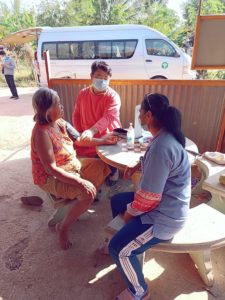
- Categories
- Alumni now

